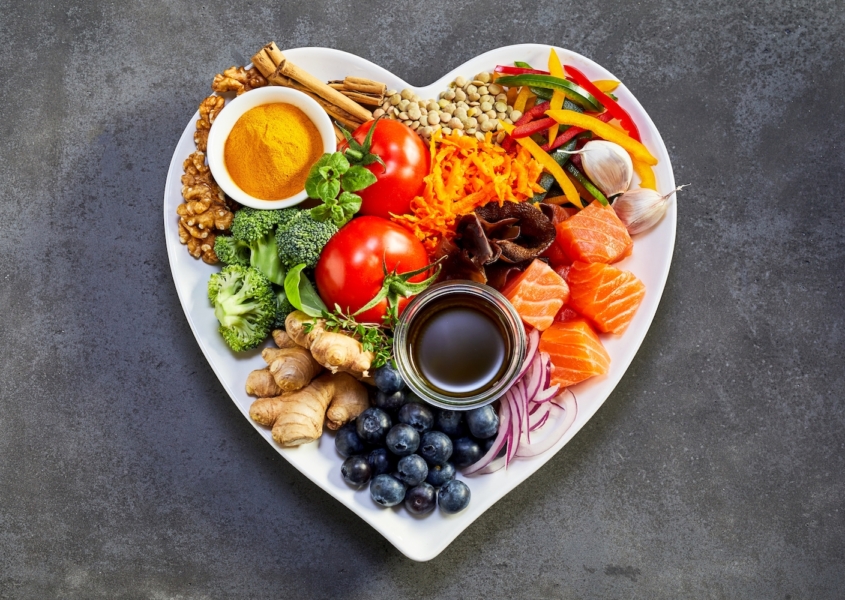Discover Foods That Lower Cholesterol & Eat Your Way to a Healthier Heart
Let’s take a deep dive into a topic that’s close to our hearts, quite literally – heart health, cholesterol, and foods that can lower cholesterol. Cholesterol, often seen as a villain in the world of health and wellness, is actually quite complex. Yes, high levels of cholesterol in our bodies can lead to heart disease, but it’s not as straightforward as it seems.
Cholesterol is a waxy, fat-like substance that our body needs to function correctly. It helps in the creation of cell membranes, certain hormones, and vitamin D. However, like many good things in life, too much of it can be problematic. High levels of cholesterol, particularly the wrong kind, can lead to a build-up on your artery walls (plaques), which can restrict blood flow.
But why should we worry about high cholesterol? Well, the scary thing about high cholesterol is that it usually doesn’t have any symptoms. It silently contributes to the hardening and narrowing of your arteries, leading to heart disease. So how can we manage our cholesterol levels and prevent heart disease? It often starts with your diet! Let’s explore more about how food can lower cholesterol…
Understanding Cholesterol: The Good, The Bad, and The Ugly
To manage cholesterol effectively, we must first understand its different types. There are two main types: Low-Density Lipoprotein (LDL) and High-Density Lipoprotein (HDL). LDL is often referred to as ‘bad cholesterol’ because it contributes to the accumulation of plaques in our arteries. HDL, on the other hand, is known as ‘good cholesterol’ as it carries cholesterol from other parts of your body back to your liver, which removes it from your body.
Then we have triglycerides, a type of fat in our blood. When we eat, our body converts any calories it doesn’t need into triglycerides, which are stored in fat cells. High levels of triglycerides combined with high LDL or low HDL can increase your risk of atherosclerosis.
The ‘ugly’ part of cholesterol comes into play when these components are out of balance. High LDL, low HDL, or high triglycerides can result in high overall cholesterol levels, leading to a higher risk of heart disease. But don’t despair – there’s plenty we can do to maintain a healthy balance of cholesterol in our bodies, and it starts with our diet.
The Role of Diet in Managing Cholesterol Levels
The food we eat plays a significant role in managing our cholesterol levels. Some foods can increase bad cholesterol, while others can decrease it or boost our good cholesterol. It’s about making smarter choices and knowing which foods to incorporate into our diet.
Saturated fats, found in red meat and full-fat dairy products, will increase your total cholesterol. Decreasing your consumption of these fats can reduce your low-density lipoprotein (LDL) cholesterol — the “bad” cholesterol.
Trans fats, sometimes listed on food labels as “partially hydrogenated vegetable oil,” are often used in margarines and store-bought cookies, crackers and cakes. Trans fats raise overall cholesterol levels.
On the positive side, there are plenty of foods that lower cholesterol, rich in heart-healthy nutrients and fibers. Let’s explore some of these beneficial foods.
Top Foods That Lower Cholesterol
Our quest for heart health brings us to a list of foods that lower cholesterol. Top of the list are healthy fats, primarily avocados and olive oil. These are rich in monounsaturated fats that lower bad cholesterol levels and increase good cholesterol. Omega-3 fatty acids, found in fish like salmon, mackerel, and albacore tuna, can lower your blood pressure and reduce the risk of developing blood clots.
Whole grains, including whole wheat, brown rice, oats, and barley, are excellent for your heart. They’re full of fiber, which can reduce the risk of heart disease by helping to lower your cholesterol.
Legumes, such as beans, lentils, chickpeas, and peas, are high in dietary fiber, minerals, and proteins. They can help lower LDL levels, reduce blood pressure, and decrease inflammation. Similarly, vegetables and fruits are packed with dietary fiber, helping to lower cholesterol levels.
Incorporating Cholesterol-Lowering Foods into Your Diet
Knowing the foods that lower cholesterol is one thing, but incorporating them into your daily diet is another. Start with simple swaps. Replace your breakfast cereal with oatmeal topped with fruits. Swap your mid-day snack with a handful of nuts. Use olive oil instead of butter while cooking. Opt for grilled fish instead of a steak for dinner.
Explore different cuisines that use heart-healthy ingredients. Mediterranean cuisine, for instance, is renowned for its use of olive oil, fresh fruits and vegetables, protein-rich legumes, fish, and whole grains.
Remember, consistency is key. A single healthy meal won’t lower your cholesterol significantly, but a pattern of healthy eating will. A heart-healthy diet can reduce your cholesterol by 10 to 20 percent, which is significant when it comes to your health.
Delicious and Heart-Healthy Recipe Ideas
Adopting a cholesterol-lowering diet doesn’t mean you have to give up on tasty food. Let’s explore some delicious and heart-healthy recipe ideas.
How about a breakfast of whole-grain toast with avocado spread and a poached egg? Or a lunch of grilled salmon with a side of quinoa and steamed vegetables? For dinner, consider a chickpea curry with brown rice. And for dessert, a bowl of fresh fruit salad or a piece of dark chocolate.
These recipes not only help in reducing cholesterol but also add a variety of nutrients to your diet. Remember, the goal is to enjoy the food while keeping it heart-healthy.
Foods to Avoid for Lower Cholesterol
While we’ve discussed foods that lower cholesterol, it’s equally important to know which foods to avoid. This includes processed meats like sausages and hot dogs, fried foods, and baked goods loaded with trans fats. Try to limit the intake of saturated fats found in red meat and dairy products.
Processed foods are often high in salt, which can increase your blood pressure, another risk factor for heart disease. Choose other seasonings and spices to flavor your food while reducing your salt intake. Also, be wary of ‘cholesterol-free’ processed foods. They may not have cholesterol, but they can still have high levels of unhealthy fats and sugars.
The Impact of Lifestyle Changes on Cholesterol Levels
While diet plays a crucial role in managing cholesterol levels, it’s part of a broader lifestyle picture. Regular physical activity can raise your good cholesterol while lowering your bad cholesterol and triglycerides. It also helps to manage your weight, another factor in cholesterol control.
Healthy lifestyle habits extend beyond diet and exercise. Quit smoking, limit alcohol consumption, and manage stress to keep cholesterol levels in check. Remember, every positive change you make in your lifestyle can help you lower cholesterol and protect your heart.
Consultation with a Nutritionist for a Cholesterol-Lowering Diet
If you’re struggling to manage your cholesterol levels through diet, consider consulting with a nutritionist. They can create a personalized meal plan that includes foods that lower cholesterol and aligns with your food preferences, ensuring long-term adherence.
The professionals can also provide valuable advice on portion control, food combinations, and meal timing, all of which can impact your cholesterol levels. They can also help you navigate the world of food labels and make educated choices about your diet.
Conclusion: The Heart of the Matter
Managing cholesterol is a crucial aspect of heart health. By understanding the role of different types of cholesterol and the impact of diet, we can make informed food choices. Remember, there are plenty of delicious foods that lower cholesterol and promote overall health.
The journey to lower cholesterol doesn’t have to be a solo one. Enlist the help of professionals if needed, and involve your family and friends for support. And most importantly, remember that every step you take towards a healthier diet is a step towards a healthier heart.
Utilize a personal chef meal service like Chefs for Seniors to make sticking to your low cholesterol diet simple and delicious! Your heart will thank you.
Disclaimer: This article is for informational purposes only and does not provide medical advice. While we at Chefs for Seniors specialize in providing healthy, customizable meals, we are not medical professionals. Always consult with your healthcare provider for medical advice, diagnoses, and treatment plans to fit your specific needs.



